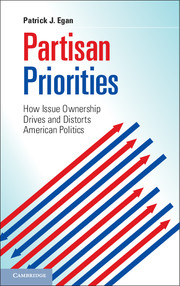3 - The Meaning and Measure of Issue Ownership
Published online by Cambridge University Press: 05 August 2013
Summary
To anyone who follows American politics, the association of specific issues with either the Democratic or Republican party makes a certain intuitive sense. The idea that Americans would trust the Republican Party to better “handle” the issue of taxes than the Democrats while putting their faith in the Democrats on the issue of health care is unsurprising. However, the reasons for these associations and thus their ultimate meaning remain remarkably vague despite decades of scholarship on the topic of issue ownership. The goals of this and the next two chapters are to bring clarity to the meaning of issue ownership by developing theoretically precise hypotheses about the concept; generating improved estimates of the parties’ reputations over time, and using these estimates to test the hypotheses with data on American public opinion and public policy.
MEASURING THE ASSOCIATIONS BETWEEN PARTIES AND ISSUES
How do we translate the intuition that there exist long-term associations between parties and issues in the public’s mind into quantifiable measures? The study of issue ownership is based largely on survey questions first identified as valid measures by John Petrocik in his pathbreaking article “Issue Ownership in Presidential Elections” (Petrocik 1996). These questions take the following form: “Which political party, the Democrats or the Republicans, do you trust to do a better job handling ... [issue X]?” Closely related questions ask Americans which party they think is better able to “deal with” a certain issue or “do a better job” on it.
Information
- Type
- Chapter
- Information
- Partisan PrioritiesHow Issue Ownership Drives and Distorts American Politics, pp. 49 - 78Publisher: Cambridge University PressPrint publication year: 2013
Accessibility standard: Unknown
Why this information is here
This section outlines the accessibility features of this content - including support for screen readers, full keyboard navigation and high-contrast display options. This may not be relevant for you.Accessibility Information
- 1
- Cited by
